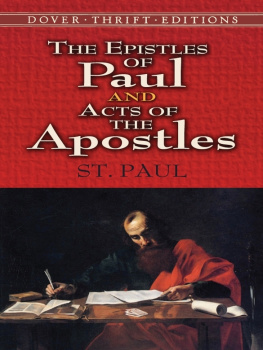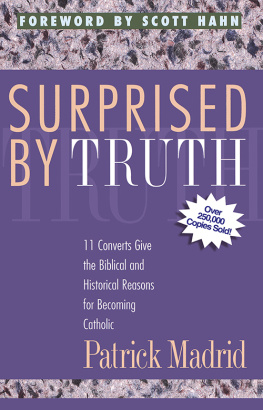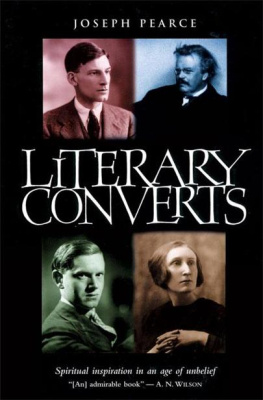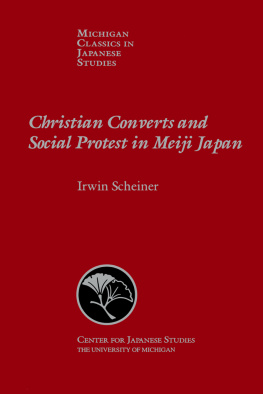THE MORALITY
OF PAULS CONVERTS
BibleWorld
Series Editor: Philip R. Davies, University of Sheffield
BibleWorld shares the fruits of modern (and postmodern) biblical scholarship not only among practitioners and students, but also with anyone interested in what academic study of the Bible means in the twenty-first century. It explores our ever-increasing knowledge and understanding of the social world that produced the biblical texts, but also analyses aspects of the bibles role in the history of our civilization and the many perspectives not just religious and theological, but also cultural, political and aesthetic which drive modern biblical scholarship.
Recent and forthcoming in the series:
Sodomy: A History of a Christian Biblical Myth
Michael Carden
Yours Faithfully: Virtual Letters from the Bible
Edited by: Philip R. Davies
The Apostle Paul and His Letters
Edwin D. Freed
Israels History and the History of Israel
Mario Liverani
The Origins of the Second Temple:
Persian Imperial Policy and the Rebuilding of Jerusalem
Diana Edelman
An Introduction to the Bible (Revised edition)
John Rogerson
THE MORALITY
OF PAULS CONVERTS
EDWIN D. FREED
First published 2005 by Equinox, an imprint of Acumen
Published 2014 by Routledge
2 Park Square, Milton Park, Abingdon, Oxon OX14 4RN
711 Third Avenue, New York, NY 10017, USA
Routledge is an imprint of the Taylor & Francis Group, an informa business
Edwin D. Freed 2005
All rights reserved. No part of this book may be reprinted or reproduced or utilised in any form or by any electronic, mechanical, or other means, now known or hereafter invented, including photocopying and recording, or in any information storage or retrieval system, without permission in writing from the publishers.
Notices
Practitioners and researchers must always rely on their own experience and knowledge in evaluating and using any information, methods, compounds, or experiments described herein. In using such information or methods they should be mindful of their own safety and the safety of others, including parties for whom they have a professional responsibility.
To the fullest extent of the law, neither the Publisher nor the authors, contributors, or editors, assume any liability for any injury and/or damage to persons or property as a matter of products liability, negligence or otherwise, or from any use or operation of any methods, products, instructions, or ideas contained in the material herein.
British Library Cataloguing-in-Publication Data
A catalogue record for this book is available from the British Library.
Library of Congress Cataloging-in-Publication Data
Freed, Edwin D.
The morality of Pauls converts / Edwin D. Freed,
p. cm. -- (Bibleworld)
Includes bibliographical references and index.
ISBN 1-84553-022-5 (hb) -- ISBN 1-84553-023-3 (pb)
1. Ethics in the Bible. 2. Bible. N.T. Epistles of Paul--Criticism, interpretation, etc. I. Title. II. Bible world (London, England)
BS2655.E8F74 2005
241--dc22
2004013721
ISBN 13: 978-1-84553-022-8 (hbk)
ISBN 13: 978-1-84553-023-5 (pbk)
Typeset by CA Typesetting
To my wife for sixty years
with greater love than ever
CONTENTS
1 AND 2 CORINTHIANS:
MORALITY COMES TO AN IMMORAL CITY (1 CORINTHIANS 16)
1 AND 2 CORINTHIANS:
MORALITY COMES TO AN IMMORAL CITY (1 CORINTHIANS 711)
1 AND 2 CORINTHIANS:
MORALITY COMES TO AN IMMORAL CITY (1 CORINTHIANS 1216)
1 AND 2 CORINTHIANS:
MORALITY COMES TO AN IMMORAL CITY (2 CORINTHIANS 1013)
1 AND 2 CORINTHIANS:
MORALITY COMES TO AN IMMORAL CITY (2 CORINTHIANS 19)
From the time of the Protestant Reformation to the present, most Protestant scholars have maintained that Pauls central message is the doctrine of justification by faith, which is frequently taken to mean also salvation by faith. In 1994 I published prematurely a little work, The Apostle Paul, Christian Jew: Faithfulness and Law, in which I suggested that Paul says some other things that are more important than his so-called doctrine of justification. The present work is a development and correction of some ideas contained in it.
Some scholars have questioned the centrality of the doctrine of justification by faith in Pauls letters, and for the last several decades have begun to question again whether the faith Paul writes about in several key texts is that of the believer or of Jesus. Books, if any, that emphasize the centrality of Pauls moral/ethical teachings with the goal of moral perfection for converts in his churches are unknown to me.
The place to begin for the best understanding of both Pauls theology and his moral/ethical teachings is with his earliest letter, 1 Thessalonians. Two texts are especially significant. The first is 1 Thess. 1.89: Your faithfulness toward God has gone out everywherehow you turned to God from idols, to serve a living and true God. The second is 1 Thess. 4.7: For God did not call us for (moral) uncleanness but (to live) in holiness. If we begin with those texts and then study Pauls letters, we learn the real significance of moral probity demanded of persons faithful toward God.
From several clues in each of Pauls letters, beginning with 1 Thessalonians, we learn that in every church there were two main groups of believers, those who were not baptized and those who were, including leaders. Paul addresses various parts of each letter to the different groups of believers who were in different stages of their progress toward moral maturity or perfection. The Hebrew scriptures, some ideas and practices of the covenant community of Qumran or a Jewish sect similar to it, contemporary Judaism, and pagan sources provide the background for most of Pauls thought and the practices in his churches.
It is a purpose of this volume to suggest evidence why persons interested in learning about the real Paul should give up the view that justification by faith in Christ is the central doctrine of his letters. Pauls words dikaio and dikaiosun, made popular by Reformation theology, are best understood in the basic sense of make (made) righteous and righteousness rather than as justify (justified) and justification. The words justify and justification are not only inadequate for fully understanding Pauls thought; they are also meaningless for most Christians today, especially students and non-specialists.
Another purpose of this book is to show that Pauls primary (first in order of time or development) effort became the conversion of Gentiles to faithfulness toward God. This is true because polytheism was the chief threat to the religion that Paul was espousing. Faithfulness toward God and the experience of the Holy Spirit, given by God, became the motivation for Pauls messages to converts as he struggled with the problems in his churches. Those problems were basically moral and social, not theological. Lay persons generally, and many scholars as well, know Paul as the proclaimer of salvation by grace through faith but too little realize the extent and significance of his moral teachings. Moreover, the real Paul never actually proclaims any message in precisely that way.













